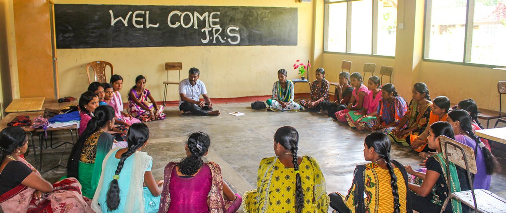
The following three Demonstration Projects are by no means exhaustive. Rather, they are meant to inspire creativity on how solidarity can be expressed by Jesuit schools, and how partnership with other Jesuit apostolates can enrich those commitments. The projects include:
A. Partnerships between Jesuit Universities and On-the-ground Apostolates Serving Refugees
By creating links between Jesuit universities in Mexico and the United States, Jesuit Refugee Service, Jesuit Migrant Service (Mexico) and Catholic Charities, important collaborative projects have been initiated and sustained. Through them, migrants and refugees now have access to psychosocial, pastoral, medical, legal, and other resources to ease their burdens – and Jesuit university graduate and undergraduate students are privileged to learn from the experiences of displaced persons at shelters, meal programs, legal clinics, and other refugee-serving projects along the U.S.-Mexico border. Well beyond the concept of service-learning projects, these encounters are changing the universities’ understanding of their curricula and potential for solidarity.
B. Proyecto Hospitalidad – University-Province Partnerships
Hospitality is a value that has mobilized the work of our universities in Spain and Latin America. Hospitalidad.es and SoyH are two clear examples of how universities have joined with the apostolates of other sectors to provide a stable community, practical experience, and wrap-around care for migrants and refugees. The project engages faculty, staff and students in university-wide service and solidarity, a model that has been adapted by other Jesuit universities.
C. Scholarship as an Expression of Solidarity
Jesuit university scholars have pursued extensive research on the attitudes of Catholics toward migrants and refugees, based on race, class, ethnicity, education, and income – and are now expanding their country-specific research to include international data sets. Outcomes, to date, demonstrate a discontinuity between Catholicism’s historic support of displaced person and current attitudes among those who identify as Catholic. Knowing what drives negative attitudes toward refugees and migrants can be the first step in creating resources for faith communities, civic leaders, and others to combat xenophobia.
